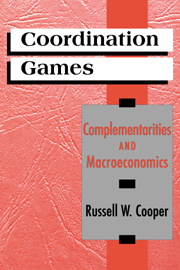Book contents
8 - Concluding Thoughts
Published online by Cambridge University Press: 02 December 2009
Summary
The goal of this book is to explore the macroeconomic implications of a particular class of model economies: those built around the presence of complementarities. These models stand in sharp contrast with more standard general equilibrium models, both in their structure and in their implications.
From the perspective of structure, interactions dominated by complementarities provide agents with an incentive to follow the behavior of others. The chapters have been structured to present a wide range of environments in which complementarities naturally emerge.
Informally, economic life is simply different in environments characterized by complementarities. In the usual general equilibrium model, there is a sense that tradeoffs, such as moving along a production possibility frontier, are of primary importance. Here the question is whether we should produce more of some goods at the expense of others. Imbedded in this class of models is a sense of conflict in the interest of the agents: more for one means less for another.
In contrast, models of complementarities are really about life “inside the production possibility frontier.” Here there is the distinct possibility for producing more of all goods if activities can be properly coordinated. So conflicting interests can become subordinate to the more general needs of coordination.
In a related way, models with complementarity provide novel insights into economic policy. First, the government can play a major role in supporting confidence in an economy. For many countries, this is seen through the wide range of public guarantee funds, such as those for deposits, pensions, etc.
- Type
- Chapter
- Information
- Coordination Games , pp. 151 - 152Publisher: Cambridge University PressPrint publication year: 1999



